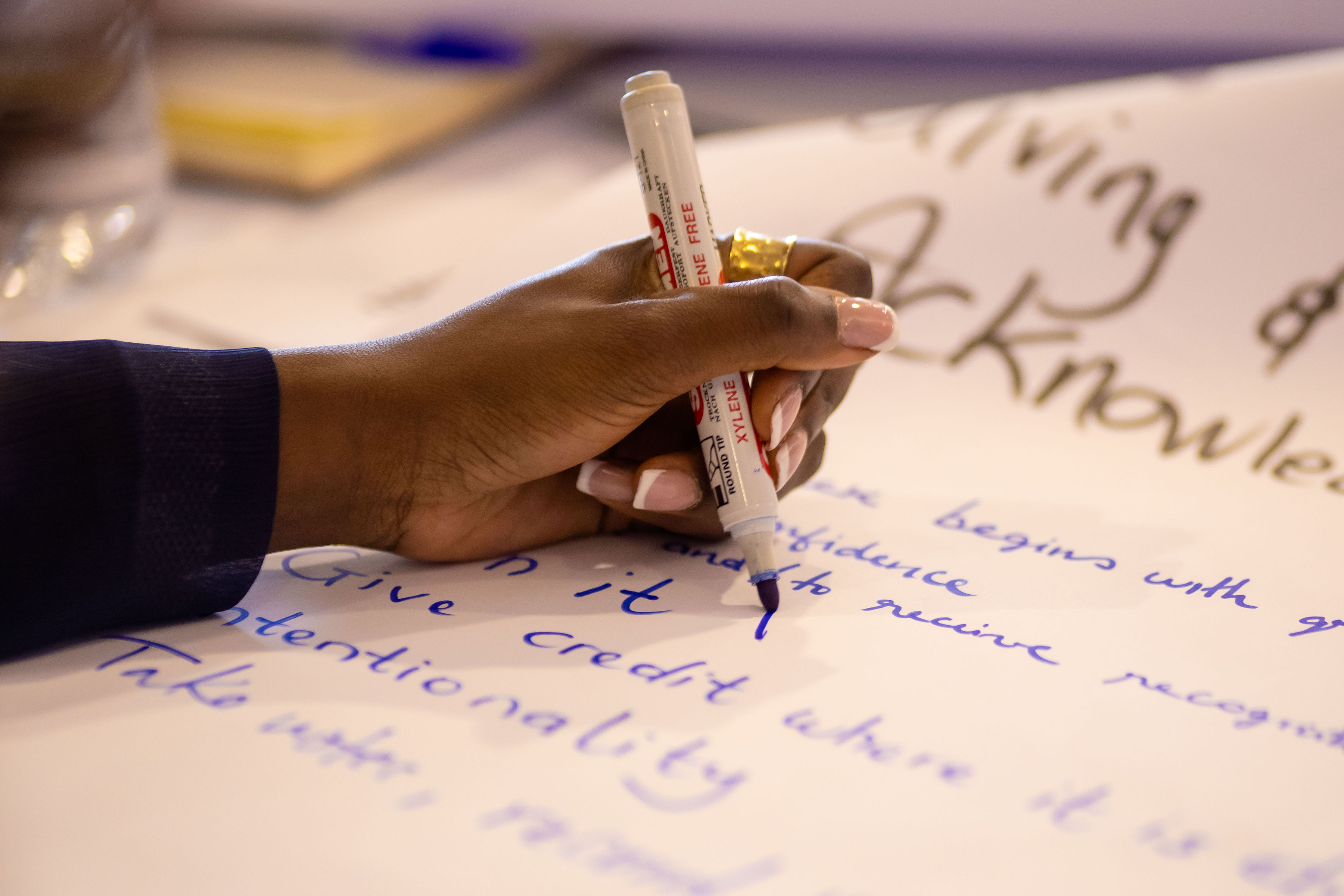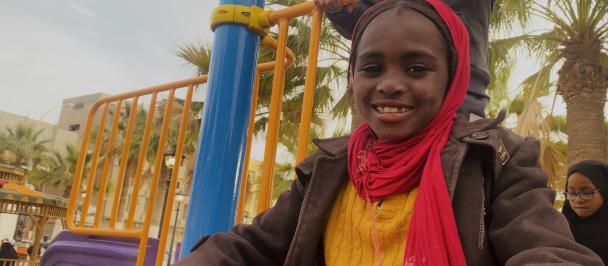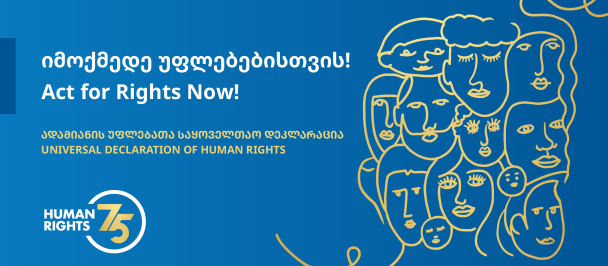In this series, graduates from the first and second AfYWL cohorts interview one another to share thoughts and advice on life beyond the Fellowship.
Conversations between cohorts: Rawan Taha and Tatenda Zvobgo
October 31, 2023

Rawan Taha was part of the first cohort of the African Young Women Leaders (AfYWL) Fellowship Programme, where she was deployed to the UNDP Country Office in Zambia. After graduating from the Fellowship, Rawan was unemployed and found the transition to be very challenging. During this time, she authored a book titled ‘No more job secrets’, which helps young people to navigate the international employment system. Six months later, Rawan found employment through a youth fellowship programme in Senegal, after which she joined the same NGO for a year. After that, she successfully applied for an opportunity with the World Food Programme in Namibia, where she is currently based. Here, Tatenda Zvobgo (TZ), a fellow from the second cohort, interviews Rawan (RT).
TZ: I've always been in awe of how you use your voice on social media. How have you developed your voice, and how did you get over impostor syndrome, anxiety and doubt?
RT: I’d say I never got over my impostor syndrome or my anxiety, if anything. I always question, is this the place for me? Am I doing things right? Am I here because I'm lucky? It's something that I'm really working on. I talk to that voice inside my head to calm myself, and to say that I deserve to be here. I know that there’s a sweet spot between not being arrogant but also not being anxious: right in the middle.
TZ: What centres you and drives you in terms of your career growth and progression?
RT: I don't know if I have an exact answer to that, but I think what drives me is really the desire to help. When I help others, it fuels me. It makes me feel like I have a purpose. I have a role to play, so that's really what I believe centres me.
TZ: How do you think the UN can remain relevant, and how can we, as youth, contribute?
RT: It's not about the relevance of the UN, it's about the people working in the UN. If you’re not strong about the mission and the vision, and you don't understand that culture, then perhaps it's not the right fit for you. So it's maybe really not about the relevance of the UN. If the UN wasn't relevant, it would no longer be there. It's about the people working for the UN, and what do they do to keep the UN relevant, to keep the mission alive to reach people all over the world, to help them and to help governments maintain peace, advance global development and reach the sustainable development goals.
Lessons from Rawan’s journey
Trust the process
'I moved back in with my parents after the Fellowship, so it was a very difficult transition. It was also difficult to convince myself that that was just the process. Writing the book was a healing journey. I realized lots of people felt like me and would take comfort in reading about my experience. It's hasn't been a linear experience, but I realized that that's my experience, and it's not uncommon. I'm going through the therapeutic process of telling myself that my journey doesn't have to be like anybody else's.'
Your job does not define you
'Part of the reason why I wanted to publish my book was to detach my identity from ‘somebody who works for the UN’. I don't want to be the girl who works for the UN, because that could change in a second. That's something that I learned outside of the Fellowship: that there needs to be more to me than a job. Who am I? What interests me? What do I want to advocate for? I realized the value of creating a brand for myself that is larger than my job.'
Invest in your network
'I'm still very much connected to the other fellows. When I was looking for jobs, one of the fellows who was working at WFP told me that they were looking for a monitoring and reporting officer. She said: ‘Why don't you apply? I'll recommend you.’ And she did. The reason I have this job is actually because of one of the other fellows. I always tell people, there's enough stars in the sky for everyone. I believe a lot in sharing, helping people to find opportunities and helping connect people to one another, because that's also networking. When you need something, people will be there for you too.'
Tatenda Zvobgo was stationed in Addis Ababa at the UNDP Regional Service Centre for Africa as part of the second AfYWL cohort. After graduating in July 2023, she spent some time back at home in Zimbabwe, before returning to work as a consultant for the same team. She describes this as an interesting transition, as everything is the same, but everything is also different. During the Fellowship, she joined several projects midway. Now, she has the opportunity to form part of projects from the beginning of a new phase. Here, Rawan (RT) interviews Tatenda (TZ):
RT: Between being a passionate lawyer and now working as a human rights activist, a researcher, a gender analyst, how do you connect those dots for yourself?
TZ: Growing up, I always said I wanted to work for the UN, and I've always been a gender advocate — so it just felt like my life came full circle when I was assigned to the gender team. It was a brilliant way for me to be able to use my skills and my educational background, but to do something that I actually have a passion in. The Fellowship was a reminder for me that those dreams I had when I was young and have carried throughout my life actually matter, and that they should be pursued ferociously. I'm a Christian, and I felt that God, was leading and guiding my life, and saying to me that the dreams that I had are valid, and that I'm exactly where I need to be, doing what I was purposed for.
RT: And how did you overcome imposter syndrome?
TZ: Being surrounded by the people who you are in awe of,definitely fuels the self-doubt and impostor syndrome. But I think like you said, the power of community is unbelievable. Being able to speak to other fellows and know that you're not the only one going through that, and have them show up for you, and encourage you, and keep pushingyou — that helped me. It's the community, the people you surround yourself with, and that also includes my family. Journaling has also helped me tremendously . To write it down, speak it out and then to analyze and really think through the thoughts that you're thinking, and to speak positively to myself, has also been very helpful.
RT: That's a good take-away! Perhaps I'll try that. Outside of your work, how do you use your powerful feminist voice to advocate for things that you're passionate about?
TZ: My sister and I started an organization in Zimbabwe called Tariro House of Hope. And we aim to advocate and assist orphans and vulnerable children, with a focus on girls. I use that platform to be able to speak to these young girls, and also to be able to assist and help them make their lives better in any way I possibly can. We currently have 60 kids that we're sending to school and we also have a feeding programme. We also have a campaign for sanitary wear, and a Youth Ambassador programme, where I am the head youth ambassador and I try to use my skills and knowledge to train other youth ambassadors on different issues, but also to just learn from them and interact with other youth. I am passionate about working with Young people and empowering them to occupy space. Apart from that, I am a big sister. I love that role so much. . I've also taken on other little sisters that are little sisters by love, and not by blood. I think there's something uniquely powerful about women and the relationships that we have. The way we support each other and hold space for each other is incredible.
Lessons from Tatenda’s journey
Take time to adjust
'I'm in the same place and in the same apartment as during the Fellowship, but it's still been difficult to get my head around the change. Even though I'm still in the same office and in UNDP, it really has been a transition and a moment for me to redefine myself. With the Fellowship there was an end goal, so to speak. Now you're grown up and have to chart your own career path, your own progression and figure out the best way to do that. It's very helpful to have mentors. It’s been a period of self-reflection.'
Career planning, your way
'I’ve been thinking a lot about how I want to define mself , not only as a professional in UNDP, but just as a person in general as well. What other things would I like to do? A part of me misses the legal profession. I'm looking at different avenues, perhaps even volunteer positions where I can further use my legal mind. I am also starting to think about personal aspects of my life – like marriage and kids. Where would I want to live and raise my children etc.'
Challenged and growing’ is a good place to be
'I'm very happy with my career progression so far. At the moment I'm still being challenged and growing. I think once I don't feel that anymore, then I'll definitely pivot.'
Interviews have been edited for length.

 Locations
Locations










